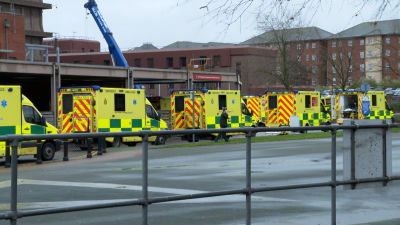Gloucestershire’s ‘complicated’ health system needs ‘streamlining’ to improve services

Health services in Gloucestershire need to be “streamlined” in order to make them easier for patients to use.
The Care Quality Commission (CQC) inspected many of the county’s urgent and emergency care services last year - including the emergency departments at Cheltenham General and Gloucester Royal.
It has now published its findings in a major new report, criticising services for being too "complicated" for staff and patients to "understand".
The report also highlighted long ambulance delays and staffing pressures.
'A significant challenge'
CQC deputy chief inspector for hospitals Nigel Acheson said: “We found the system to be complicated.
“The urgent and emergency care pathways in Gloucestershire should be streamlined to ensure that people and staff are better able to understand the services available and allow people easy access to the right care.
“Ensuring the timely transfer of patients waiting in ambulances into the urgent and emergency care department was a significant challenge.
“System leaders should consider how they might better maximise the local authority’s experience to help free up space on hospital wards to enable patients to be transferred out of the emergency department to create space.
“Due to staffing pressures, there are empty beds in care homes across Gloucestershire which could be used to support older patients to leave hospital as soon as they are able to.
“In turn, this would free up beds in the hospital wards easing pressure on the waiting times there.”
The CQC did highlight some positives in Gloucestershire’s services - including calls to the county’s NHS 111 team, which ranked well compared to the national average.
They also praised community urgent care services for being “generally well run”.
The inspections were carried out to better understand how services respond to challenges faced as individual providers, but requiring a system-wide response.
Across the system, inspectors found:
The NHS 111 service was performing well, compared to the national average. However, a higher than normal staff sickness rate combined with an increase in the volume of calls higher due to the Covid-19 pandemic caused longer delays in giving clinical advice than had been seen before. However, the provider of this service - Practice Plus Group - had an action plan in place to manage the risks involved and inspectors are monitoring its progress in taking this forward.
The local directory of services used by staff in urgent and emergency care to direct patients to the right treatment and support was found to have inaccuracies and out of date information. This meant there was a delay in assessing patients and some patients were sent to the wrong services. For example, the local directory of services had not been updated to ensure children were signposted to an emergency department with a paediatric service.
The community urgent care services in Gloucestershire were generally well run, there were still opportunities to improve patient flow through services to reduce delays, and ensure people are treated in the correct environment.
During the inspection of South Western Ambulance Service NHS Foundation Trust CQC found some patients experienced a long delay in response to 999 calls. There were also delays in the handover from the ambulance crew to local hospitals due to a lack of available beds on wards meaning patients were waiting too long in emergency departments.
Patients were also remaining in hospital for longer than necessary, due to delays in their discharge home or to other services. The reasons for these delays were complex and involved many different providers of health and social care.